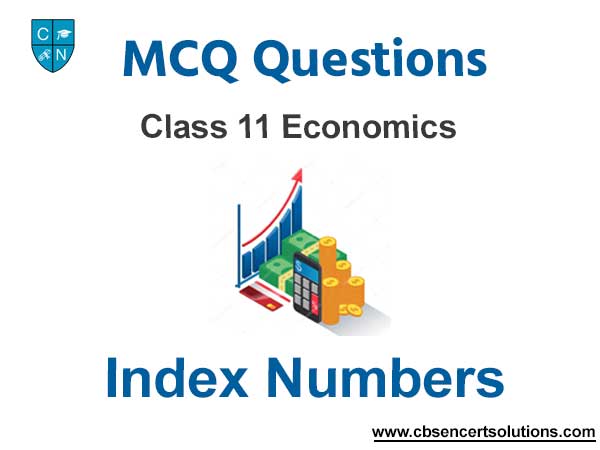Check the below NCERT MCQ Class 11 Economics Chapter 8 Index Numbers with Answers available with PDF free download. MCQ Questions for Class 11 Economics with Answers were prepared based on the latest syllabus and examination pattern issued by CBSE, NCERT and KVS. Our teachers have provided below Index Numbers Class 11 Economics MCQs Questions with answers which will help students to revise and get more marks in exams
Index Numbers MCQ Questions for Class 11 Economics with Answers
Refer below for MCQ Class 11 Economics Chapter 8 Index Numbers with solutions. Solve questions and compare with the answers provided below
Class 11 Economics Index Numbers MCQ PDF has been gathered for students to rehearse. Students can prepare for this MCQ of Index Numbers to score good marks in their exams. Each question has four choices with answers. Firstly, Solve all these Questions and check your answer with the given answer. If your answers do not match with the right answer, Don’t worry try again because You need to prepare daily to score higher marks in the Class 11 Economics Exam.
Question. A consumer price index measures changes in
a. retail prices
b. wholesale prices
c. producers prices
d. None of the above
Answer
A
Question. Index number for base year is always considered as——
a. 101
b. 100
c. 201
d. 1000
Answer
B
Question. While computing a weighted index, the current period quantities are used in the:
a. Paasche’s method
b. Laspeyre’s method·
c. Marshall Edgeworth method
d. Fisher’s ideal method
Answer
A
Question. The most suitable average in chain base method is:
a. Arithmetic mean
b. Median
c. Mode
d. Geometric mean
Answer
D
Question. When the price of a divided by the price of the preceding year, we, get:
a. Value index
b. Link relative
c. Simple relative
d. None of them
Answer
B
Question. Index number was first constructed in:
a. 1750
b. 1760
c. 1764
d. 1770
Answer
C
Question. Most widely used weighted index is:
a. Paasche’s Index
b. Laspeyres Index
c. Fisher’s ideal Index
d. Marshall-Edgeworth Index
Answer
B
Question. The factor reversal test is satisfied by:
a. Simple GM of price relatives
b. Marshall-Edgeworth Method
c. Fisher’s Ideal Index
d. All of the above
Answer
C
Question. Fisher’s index number is based on:
a. AM of Laspeyres and Paasche’s Index
b. GM of Laspeyres and Paasche’s Index
c. HM of Laspeyres and Paasche’s Index
d. None of the above
Answer
B
Question. Consumer price index is equal to:
a. Bowley’s price index
b. Paasche’s price index
c. Fisher’s ideal index
d. Laspeyres price index
Answer
D
Read the following statements given below and choose the correct alternative.
Question. Statement 1- The choice of method for the construction of an index number entirely depends upon the object with which a particular index number is constructed
Statement 2- Fisher’s method is considered an ideal method to construct index numbers.
a. Both are correct
b. Both are incorrect
c. Statement 1 is correct and statement 2 is incorrect
d. Statement 1 is incorrect and statement 2 is correct
Answer
A
Question. Statement 1- The consumer price index is the number that measures the average change and prices paid by the specific laws of consumers for goods and services consumed by them in the current year in comparison with the base year.
Statement 2- consumer price index doesn’t indices the cost of living.
a. Both are correct
b. Both are incorrect
c. Statement 1 is correct and statement 2 is incorrect
d. Statement 1 is incorrect and statement 2 is correct
Answer
C
Question. Assertion- Inflation refers to the situation of rising the general price level in our country over a fairly long period of time.
Reason- Inflation is measured in terms of a consumer price index.
a. Both assertion and reason are true. The reason is the correct explanation of the assertion
b. Both assertion and reason are true. The reason is not the correct explanation of the assertion
c. Assertion is true but the reason is not
d. Reason is true but the assertion is not
Answer
B
